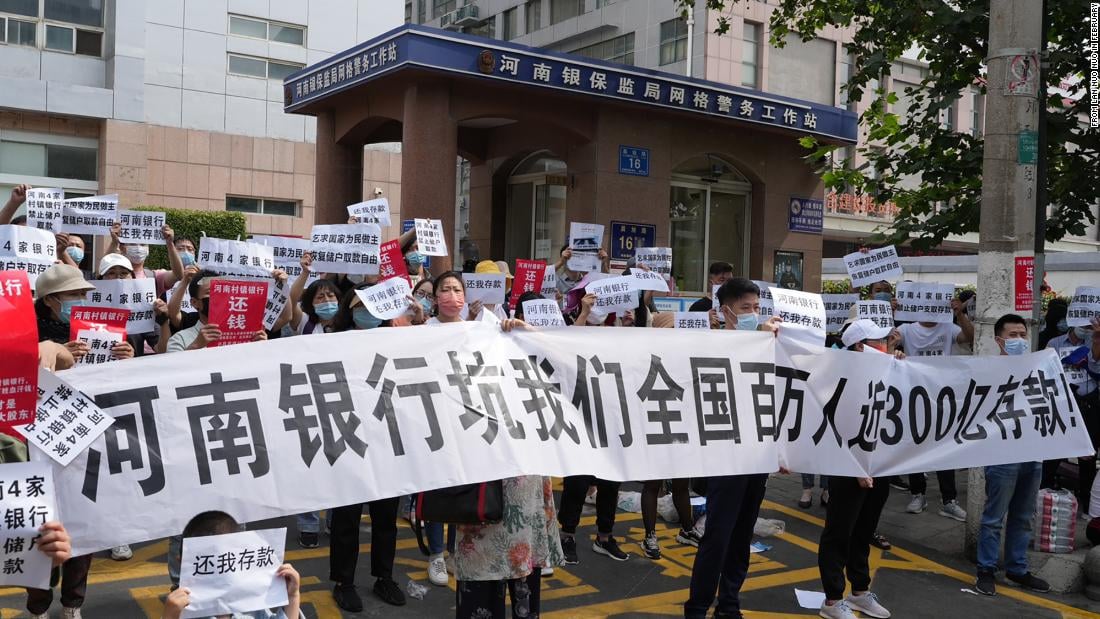Hong Kong arrests 5 for sedition before China rule anniversary
Two men, aged 28 and 30, were arrested and charged, with up...

China’s small banks are struggling. Savers might lose everything. (credits:Google)
In the central Chinese province of Henan, Peter had deposited his about $6 million life savings into accounts at three minor banks. He claims that since April, he has not been able to access them.
For security purposes, the 45-year-old businessman requested that we call him Peter. He is one of thousands of depositors battling to recoup their cash from at least six banks in rural provinces of central China. He is from the eastern city of Wenzhou.
“I am on the verge of a nervous collapse. I can’t sleep “Tells CNN Business, Peter.
According to Peter, who spoke to CNN Business, whenever he attempted to access his accounts online, a message stating that the website was undergoing maintenance and that services will be unavailable for a while would appear on the homepage. These services have not been reinstated two months later.
Four banks in Henan halted cash withdrawals in April, which set off the issue.
China’s local banks are only allowed to accept deposits from customers within their own country, but officials claim that “third-party platforms” were utilised to take deposits from people outside the country. For instance, Peter’s hometown is more than 700 miles from the banks in Henan.
A major shareholder in each of the four banks has been charged by the country’s banking regulator for fraudulently luring savers’ money. The China Banking and Insurance Regulatory Commission stated in May that Henan New Fortune Group, a stakeholder of the four village banks, had illegally absorbed the public’s funds through internal and external cooperation, the use of third-party platforms, and fund brokers.
It further stated, “The police have opened a case for investigation into the matter.”
Small Chinese banks have been targeted increasingly frequently in recent years, and several of them have been charged with financial fraud or corruption. However, experts fear that a much more serious financial crisis may be on the horizon, brought on by the aftermath of a real estate catastrophe and mounting bad debts associated with the Covid-19 pandemic.
The total amount of money that bank depositors are unable to withdraw has not yet been officially estimated. Neither the local police nor the federal banking watchdog responded to CNN Business’ request for a comment.
According to a calculation made in April by the state-owned magazine Sanlian Lifeweek, as many as 400,000 banks customers throughout China were unable to access their savings.
This is a drop in the vast ocean of China’s banking system, but about 4,000 small lenders hold about 25% of the industry’s total assets. These lenders frequently have ambiguous ownership and governance structures and are therefore more susceptible to corruption and the country’s recent economic slowdown, according to experts.
According to Frank Xie, a professor at the University of South Carolina Aiken who specialises in Chinese business and the economy, “the magnitude of the bank scandals where bank personnel embezzle and steal monies from depositors is disturbing, and what is uncovered could only be the tip of the iceberg.”
“Bank runs could become more frequent and more significant as the Chinese economy slows down further, the fiscal shortage worsens, and debt repayments among Chinese enterprises, particularly in the real estate sector,” he said.
Many savers are at their limit. Hundreds of depositors flocked to Zhengzhou, the capital of Henan, late last month in an unsuccessful attempt to protest outside the headquarters of the banking regulator and demand their money returned.
In June, there was another demonstration planned. According to six persons who spoke with CNN and posts on social media, the depositors were shocked to see that their health codes, which were green when they left, had changed to red when they arrived in Zhengzhou. Anyone having a red code, which is ordinarily given to those with Covid infection or those authorities judge to be at high risk of infection, is immediately persona non grata.
They are prohibited from using any public transportation or spaces, and the government frequently quarantines them for weeks.
The Zhengzhou administration has been contacted by CNN for comment. The Henan Provincial Health Commission stated that it was “investigating and confirming” the concerns from depositors who received red codes to thepaper.cn, a state-run news website.
Catch all the Business News, Breaking News Event and Latest News Updates on The BOL News
Download The BOL News App to get the Daily News Update & Live News.